An exclusive IFOP survey for Les Makers
Big resignation, quiet quitting, demands for better wages and working conditions, unemployment insurance reform… Rarely has work been questioned as much as it is todayThe recent declarations of several political personalities – among them Sandrine Rousseau, Fabien Roussel and François Ruffin – on the subject are proof of this.
In this particular context, marked in particular by the post-Covid-19 period, which has considerably modified the relationship with the company, Les Makers has entrusted IFOP with the task of measuring the relationship of the French to work.
The first part of this large-scale survey, in which more than 2,000 people were consulted, clearly shows a rise in disenchantment among our compatriots, more and more of whom are showing detachment towards their professional environment.
The second part of the IFOP study focuses on the values attached to work and how the French perceive it. Do they have the right to be lazy, as the ecofeminist MP Sandrine Rousseau claims? Is Fabien Roussel, secretary general of the PCF, supported when he says he prefers the left of work to the left of benefits? Do merit, idleness, effort or laziness have a political color?
So many questions to which the French answer without detours!
Here are the statistics from this survey:
- 37% of French people are concerned by “quiet quitting
- 45% do “just right” at work
- 74% think that younger generations are working less than before
- 58% of French people are ready to stop working for the same passive income
- 73% identify success as a right-wing value
- 70% see laziness as a left-wing value
Contents
- Quiet quitting” affects more than one in three employees in France
- Doing “just right” is not laziness
- 58% of French people are ready to stop working for the same passive income
- Is work a right-wing value?
- Right to laziness, transition and breaks: the French approve
- Effort, merit and success are right-wing connotations, assistance, laziness and idleness are left-wing ones
- The unemployed not willing enough?
Quiet quitting” affects more than one in three employees in France
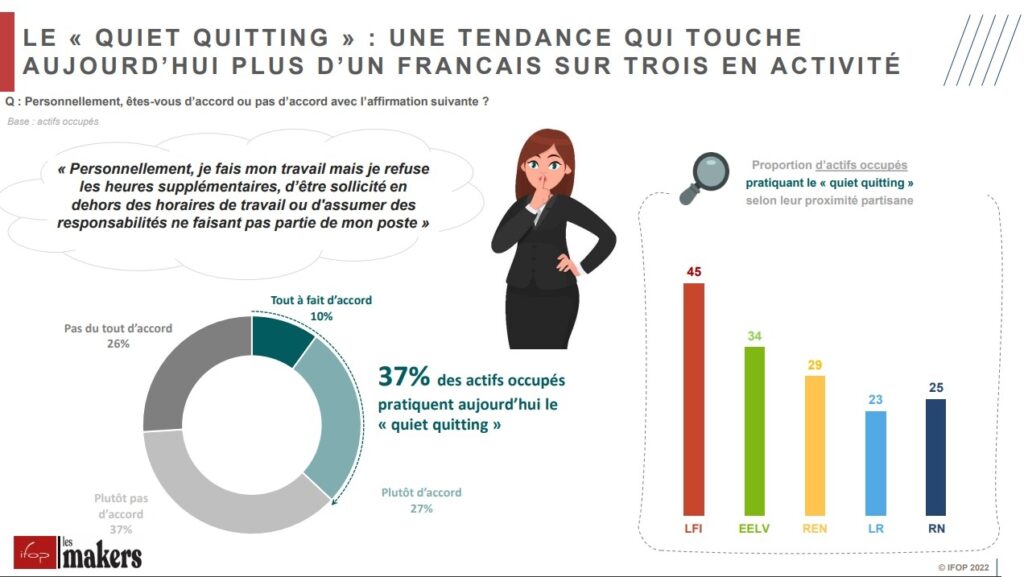
Whether they only go to work for the salary they are paid or whether they feel they are giving more to the company than they receive, more and more French employees are showing their detachment from work. A feeling that feeds the “quiet quitting”.
On the same subject : how to make money on the internet?
37% of employees adhere to this phenomenon by remaining strictly within the framework of their employment contract, refusing overtime and any tasks that do not fall within their mission.
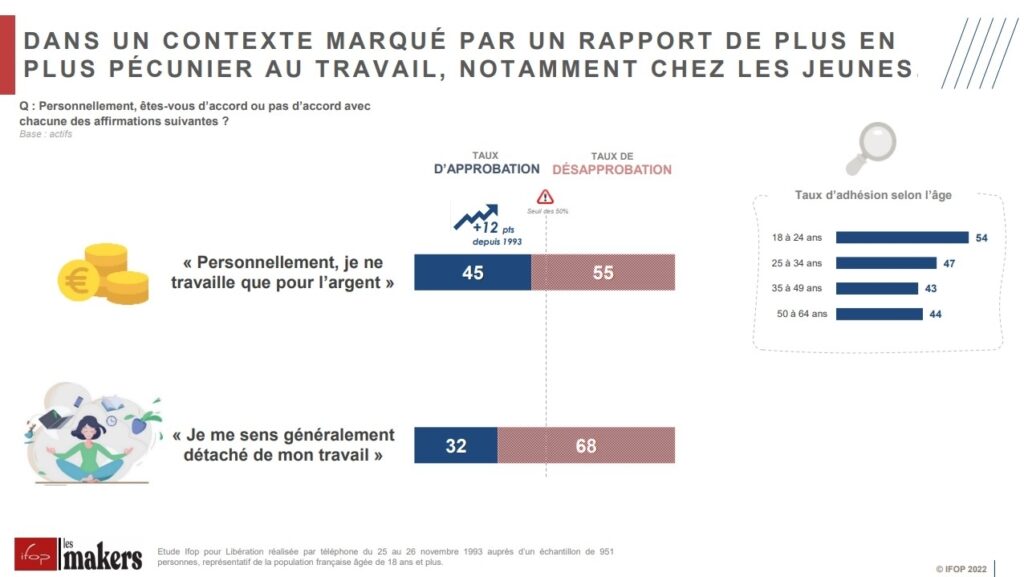
Nearly half (45%) of those surveyed, including 14% who strongly agree with the statement, go to work only for the paycheck they get. This figure has increased significantly since 1993, when only one third (33%) of respondents indicated that money was their main motivation. And while 32% of the working people surveyed feel detached from their work, only 5% agree completely with this proposition. Thirty years ago, more of them (39%) reported this situation.
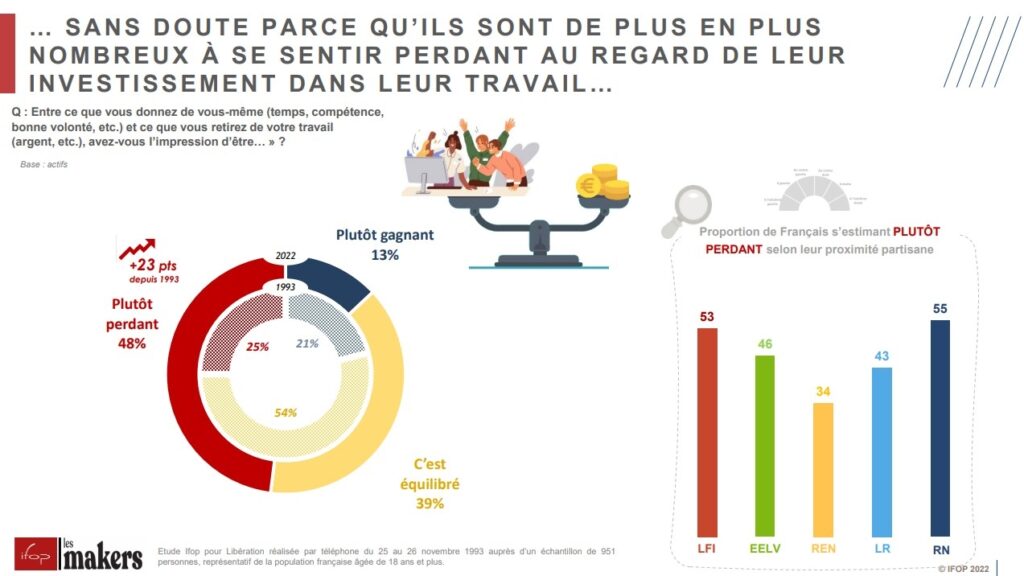
In three decades, the proportion of French workers who feel they give more than they get from their work has almost doubled, from 25% in 1993 to 48% in 2022. The majority at the time (54%), only 39% of those who felt that the report was fairly balanced. Just over one in ten (13%) employees today feel that they benefit from their commitment to the company that employs them.
Doing “just right” is not laziness
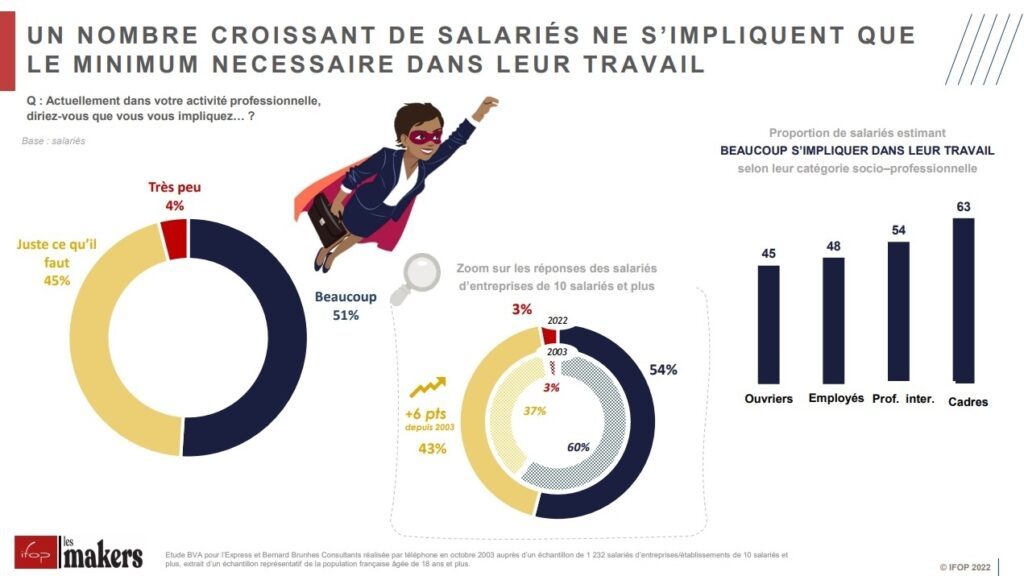
More than 4 out of 10 employees do “just right” when they are at work. This attitude concerns in particular the younger generations, who are seen as less hard-working than their elders, but which only shocks a minority of French people.
On the same subject : how to make money with Amazon affiliation?
The French workforce is roughly split between those who say they are very involved in their work (51%) and those who say they do just enough (45%). The share of workers who admit to doing very little remains marginal (4%). If we compare these figures to a 2003 study, fewer employees in companies with 10 or more employees (54%) now consider themselves to be highly involved than 20 years ago (60%).
Younger generations are clearly perceived as less hardworking than their elders. Nearly three quarters of French people (74%) think so, including those directly concerned, since 61% of 18-24 year olds and 71% of 25-34 year olds agree with this statement.
Long viewed with suspicion, nearly two-thirds (63%) of those surveyed do not believe that telecommuting means less productivity for those who use it. Obviously, the Covid-19, which saw millions of French people having to work at home, has considerably changed mentalities on the subject.
On the same subject : how to generate passive income on the internet?
The fact that many employees feel they are losing out on what they give and receive from their work leads the French not to judge negatively those of them who are content to just do their job. This attitude is only equated with laziness by less than a quarter (22%) of respondents, and uniformly so regardless of the respondents’ political position.
58% of French people are ready to stop working for the same passive income
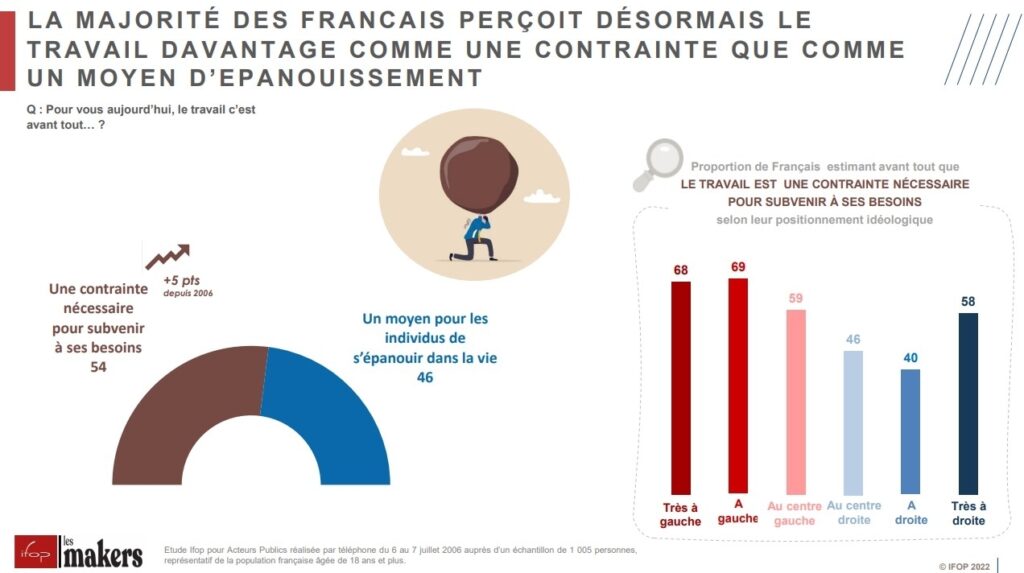
Divided on the question, a small majority of French people (54%) believe that work is above all a constraint rather than a source of fulfillment (46%). This feeling of an obligation from which it is difficult to escape is clearly more pronounced among left-wing than right-wing supporters. It is also on the rise in public opinion: in 2006, a previous IFOP survey placed fulfillment (51%) ahead of constraint (49%).
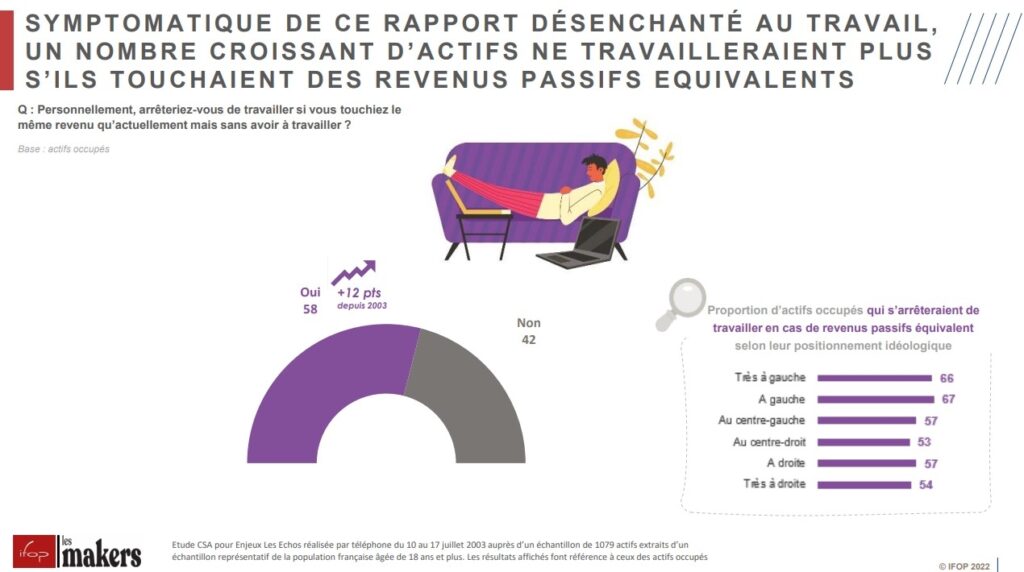
As a sign that the value placed on work has clearly changed in recent years, 58% of French people now say they would stop working if they could receive the same income without having to work as they do today. In 2003, less than half (46%) of those surveyed by CSA for Les Echos were in this situation.
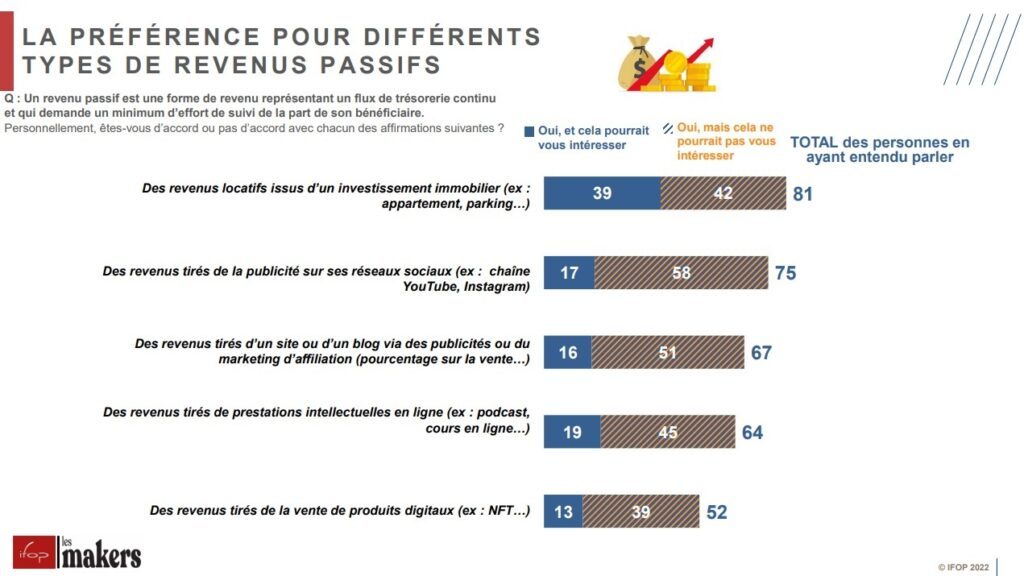
Potential passive income from real estate investment is the one most clearly identified by the French (8 out of 10 have already heard of it) and also the one that could possibly interest them (39% of respondents are in this case). This interest decreases as soon as other passive income is mentioned, even if the respondents are aware of it, because it is probably more difficult to implement by the majority of the people interviewed. This is the case for revenue from advertising on social networks – 75% know about it and 17% could be interested – or from affiliate marketing on sites or blogs – 67% know about it, 16% could start.
Is work a right-wing value?
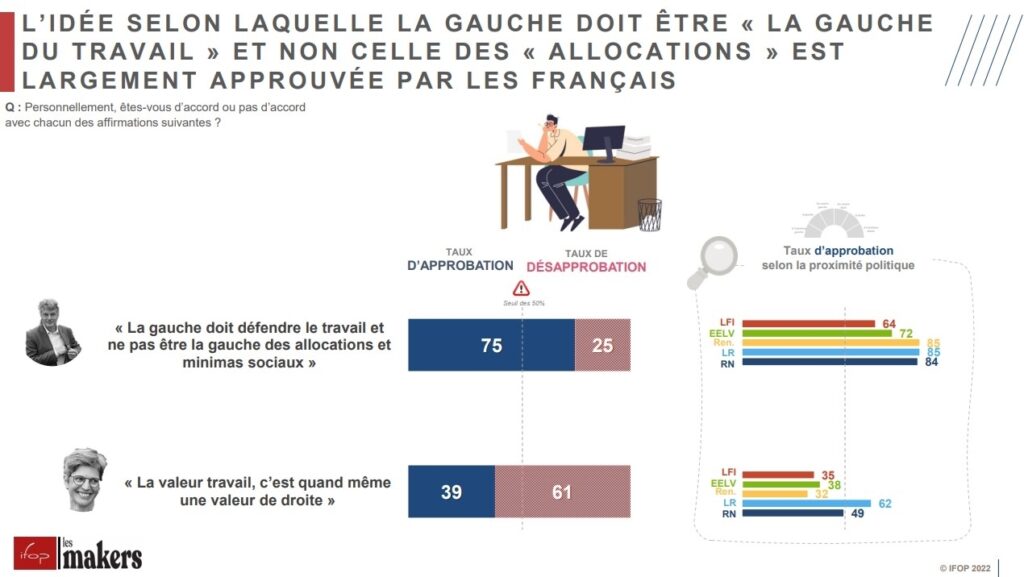
Except for the French who are ideologically very left-wing, the sentence of Fabien Roussel, secretary general of the PCF, “The left must defend work and not be the left of benefits and social minima” is approved by three quarters (75%) of respondents. If 44% of those who define themselves as “very left” agree with this statement, the support rises to 72% and 75% on the left and center-left and reaches 83% on the right.
Related: 11 online business ideas
Is work “a right-wing value” as Sandrine Rousseau maintains? Yes, 62% of Republican voters, the only ones in this survey to agree with the ecofeminist MP, say so. On the other hand, she is not convincing in her own camp: hardly more than a third of the LFI (35%) and EELV (38%) supporters agree with her statement.
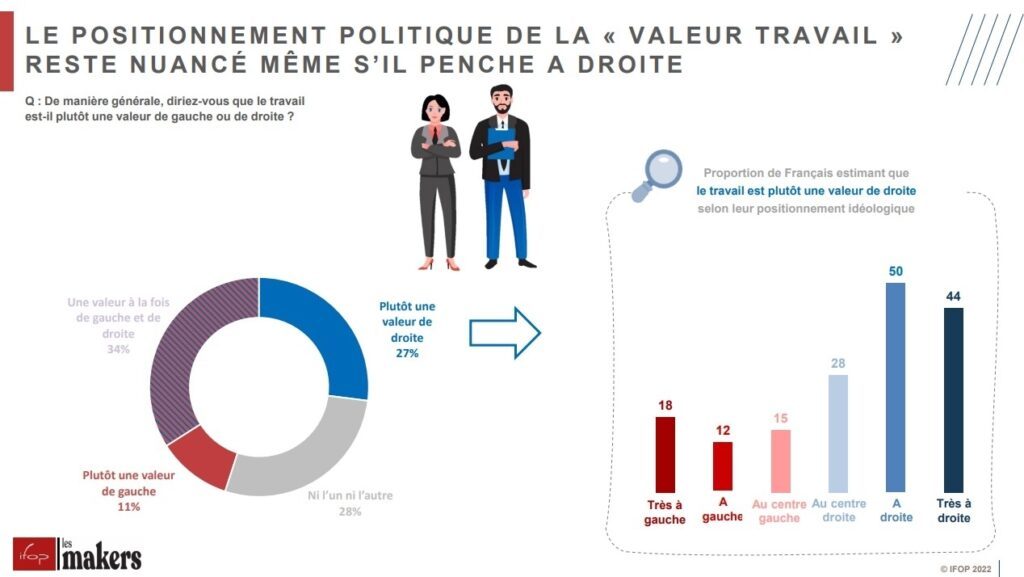
More generally, the French are reluctant to attribute a divisive political dimension to work. Sixty-two percent do not choose, either because they consider work to be a right-wing or left-wing value (34%), or because they think it does not belong to either camp (28%). Among those who have a stronger opinion, work is seen more as a marker of the right (27%) than of the left (11%).
Right to laziness, transition and breaks: the French approve
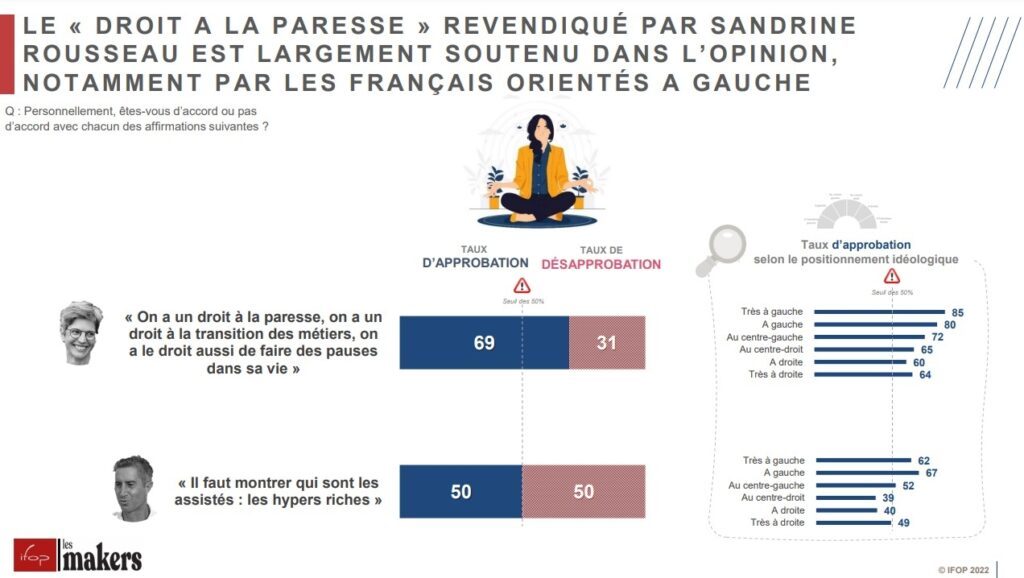
If it caused a buzz because of the use of the word laziness on which attention was focused, Sandrine Rousseau’s statement – “We have a right to laziness, we have a right to transition from one job to another, we also have a right to take breaks in our lives” – does not shock the French when it is taken as a whole. 69% of the people questioned by IFOP agree with the sentence pronounced by the deputy, which is widely approved by citizens close to the left, but is also approved in significant proportions by right-wing supporters.
On the same subject : how to generate additional income online?
The speech of the LFI deputy François Ruffin – “We must show who the assistants are: the hyper-rich” – splits opinion into two blocks at 50%. Unsurprisingly, those close to the left agree with the statement of the elected representative of the North, while those close to the right break away from it.
Effort, merit and success are right-wing connotations, assistance, laziness and idleness are left-wing ones
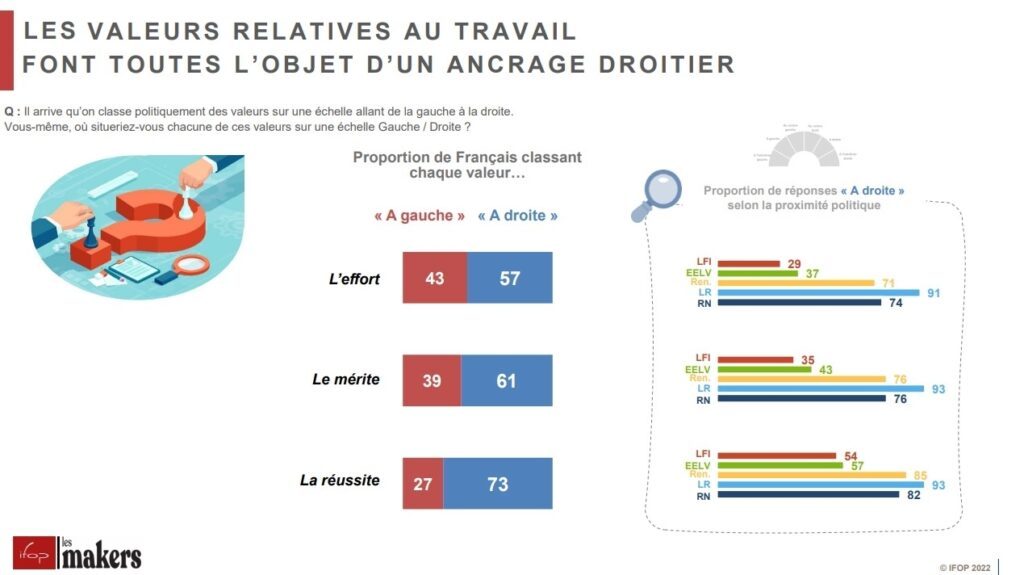
Success is clearly perceived by the French as a value politically associated with the right. More than 7 out of 10 people (73%) identify it as such. To a lesser extent, merit is also associated with the right more than with the left (61%), as is effort (57%).
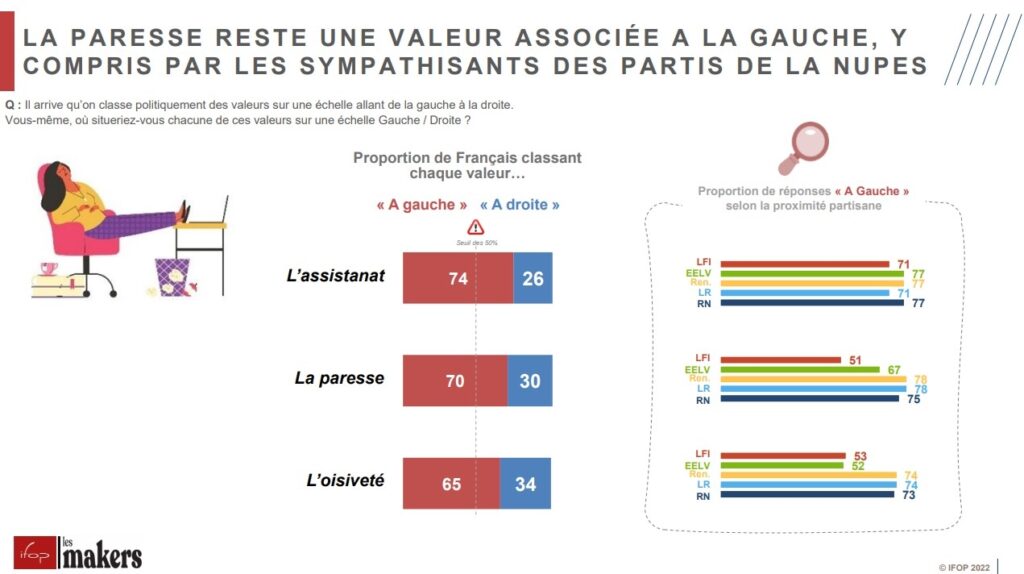
In contrast to the values of effort, success and merit that the French classify as right-wing political positioning, the vast majority associate welfare (74%), laziness (70%) and idleness (65%) with the left.
On the same topic: how to make money with affiliate marketing?
But where do you find the most lazy people? Among the rich or among the poor? On the left or on the right. It all depends on the ideological positioning of the people interviewed. On the right, lazy people are considered to be more numerous among the poor and the left, while on the left, the opposite is clearly thought.
The unemployed not willing enough?
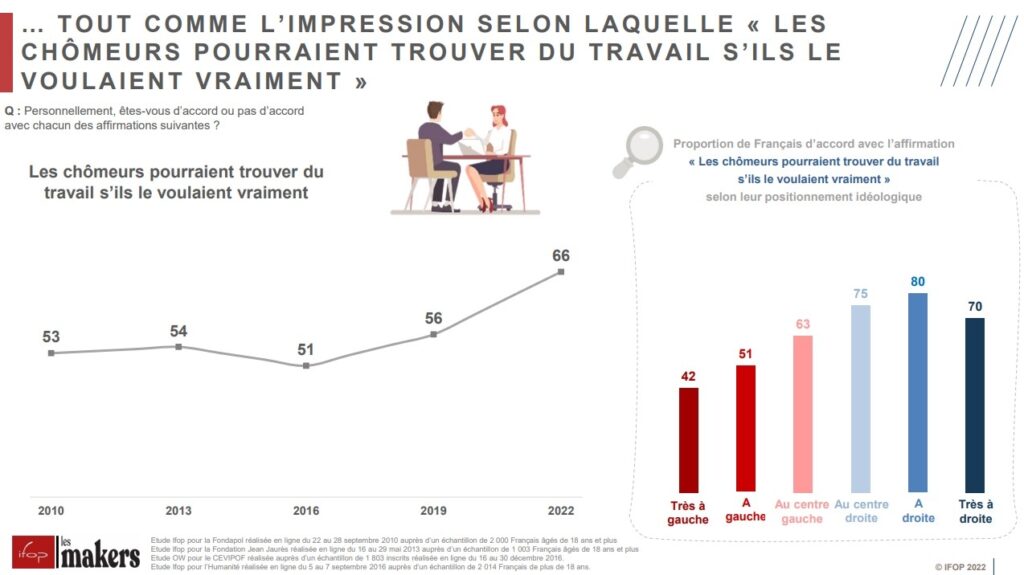
Two thirds (66%) of French people, particularly on the right, but also on the left, believe that the unemployed could find work if they really wanted to. This sense that job seekers are not making the full effort to find work has been growing in recent years: in 2010, just over half of respondents (53%) felt the same way. The decrease in unemployment and the perception of sectors of activity in great tension for manpower – such as the hotel and restaurant industry or the construction industry – nourish this feeling that it is now easier to find a job.
Survey conducted from October 11 to 13 by IFOP for Les Makers by self-administered questionnaire among 2,015 people aged 18 and over, representative of the French population.



